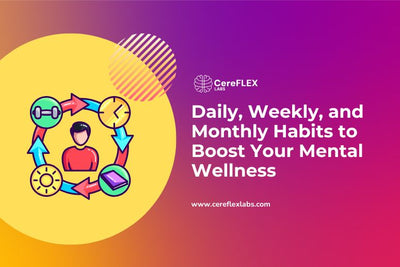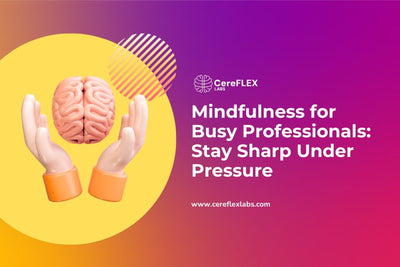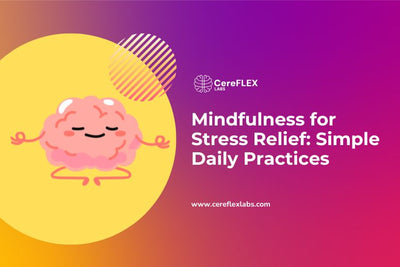Stress doesn’t just cloud your mind—it drains your energy, weakens focus, and chips away at motivation. In today’s fast-moving world, it’s easy to feel overwhelmed and mentally scattered.
That’s where Rhodiola rosea comes in.
Backed by both history and science, this adaptogenic herb offers a natural way to help your body and mind handle stress. People have relied on Rhodiola for centuries to push through fatigue and stay resilient in tough environments. Today, it’s gaining recognition for its ability to reduce anxiety, fight exhaustion, and sharpen mental clarity—without overstimulating your system.
Unlike synthetic stimulants that cause spikes and crashes, Rhodiola works in tune with your body. It promotes a sense of calm focus and lasting energy.

What is Rhodiola Rosea?
Rhodiola rosea, also called golden root, arctic root, or rose root, is a flowering herb found in the cold, mountainous regions of Europe and Asia. It has been used for centuries in Scandinavian and Russian traditional medicine to fight fatigue and improve mental endurance—especially in extreme climates.
This herb is part of a class of natural substances known as adaptogens. Adaptogens help the body adapt to stress, restore balance, and support resilience. The benefits of adaptogenic herbs include reduced anxiety, better concentration, and more stable energy levels—without relying on stimulants.
Rhodiola’s active compounds, rosavin and salidroside, play a central role in its effects. These naturally occurring chemicals help regulate the body’s stress response and support brain function.
Rhodiola is available in various forms, including capsules, tablets, liquid tinctures, and dried root powder. Most high-quality products are standardized to 3% rosavins and 1% salidroside, which research shows is an effective ratio.
People commonly take Rhodiola to ease stress, sharpen focus, manage mild symptoms of depression, enhance physical performance, and support brain health. Some early research also points to its antioxidant and anti-inflammatory properties, though further studies are needed to confirm these benefits in humans.
How Rhodiola Rosea Works
Rhodiola rosea works by supporting your body’s response to stress at the chemical and hormonal levels. It mainly affects two areas: neurotransmitters and the stress-response system.
First, it helps balance important brain chemicals like serotonin and dopamine. These neurotransmitters influence your mood, focus, and energy. When stress disrupts their balance, you may feel foggy, irritable, or drained. Rhodiola supports a steady mental state by keeping these chemicals in check.
Second, it targets your hypothalamic-pituitary-adrenal (HPA) axis, which manages how your body reacts to stress. The HPA axis controls cortisol levels—the hormone released during stressful situations. High cortisol can interfere with sleep, reduce concentration, and lead to burnout.
Rhodiola helps modulate this system by reducing excess cortisol and promoting balanced energy throughout the day. It doesn’t overstimulate your body like caffeine or synthetic stimulants. Instead, it works in harmony with your system to restore calm and clarity.
This gentle balancing act is key to the science behind stress reduction. By regulating stress hormones and supporting brain function, Rhodiola addresses both the mental and physical effects of stress.
What are the benefits of Rhodiola rosea?
Rhodiola rosea isn’t just a stress reliever—it’s a well-rounded nootropic that supports both mental and physical performance. As an adaptogen, it enhances the body’s ability to stay balanced during stressful times. Let’s take a closer look at its key benefits.

May Reduce Symptoms of Depression
When levels of serotonin and dopamine drop, your mood and energy can suffer. Rhodiola may help restore that balance in a natural way.
It’s often included among natural stress relievers because of its ability to support neurotransmitters tied to emotional well-being. In one study, people with mild to moderate depression were given various combinations of sertraline (Zoloft)and Rhodiola.
After 12 weeks, those who took two Rhodiola capsules along with sertraline saw the most improvement in mood. Participants taking just one capsule also experienced benefits, outperforming the placebo group.1
While more research is needed, these findings suggest that Rhodiola could be a gentle alternative for individuals who can’t tolerate or prefer to avoid prescription antidepressants.
Could Help Lower Stress
Rhodiola’s adaptogenic properties make it effective at easing symptoms linked to chronic stress and burnout. It supports your nervous system and helps maintain emotional stability.
A clinical trial with 118 participants experiencing stress-related burnout found that 400 mg of Rhodiola taken daily for 12 weeks led to notable improvements in mood and stress levels.2
A broader review also confirmed Rhodiola’s role in helping the body normalize functions disrupted by stress. This includes regulating hormones, enhancing energy, and improving focus during high-pressure periods.3

Might Improve Fatigue
Stress, poor sleep, and anxiety can leave you mentally and physically exhausted. Rhodiola may offer support by increasing endurance and restoring energy levels.
In a study of 100 people with chronic fatigue, daily intake of 400 mg Rhodiola over eight weeks led to significant improvements in tiredness, mood, and cognitive sharpness—as early as week one.4
May Support Cognitive Function
Age-related memory decline and mental fog can impact daily productivity. Rhodiola has been studied for its potential to support long-term brain health and boost mental clarity.
A 2022 review found that Rhodiola can improve emotional regulation and sharpen thinking skills. These effects may help protect against age-related cognitive decline and improve day-to-day performance, especially under stress.5
May Help Manage Diabetes
Early research in animals suggests Rhodiola might help regulate blood sugar levels and protect against complications related to diabetes.
In one study, the compound salidroside was found to protect mice from kidney damage associated with diabetes.6 These findings are promising but still in early stages. Anyone with diabetes should speak with a dietitian or doctor before trying Rhodiola.
Might Help Fight Cancers
Some lab studies suggest that Rhodiola may offer protective effects against certain cancers, including those of the breast, colon, bladder, and prostate.7
However, most of this research is preclinical and based on animal or cell studies. While results are encouraging, Rhodiola is not a substitute for medical treatment. It may play a supportive role, but further studies are needed in humans.

May Boost Physical Performance
Rhodiola is popular among endurance athletes and gym-goers for its ability to fight fatigue and reduce muscle soreness.
A 2022 review of 10 studies showed that Rhodiola supplementation can enhance recovery, reduce oxidative stress, and improve muscle strength and power. Importantly, no major side effects were reported.8
Its antioxidant effects may also help with inflammation and post-exercise muscle repair.
Recommended Dosage and Available Forms
To get the most out of Rhodiola rosea, the right dosage and product quality are key. Timing matters too.
It’s best to take Rhodiola on an empty stomach, ideally in the morning or early afternoon. Because it can have a mild energizing effect, avoid taking it late in the day—it may interfere with sleep in sensitive individuals.
Most high-quality supplements are standardized extracts that contain 3% rosavins and 0.8% to 1% salidroside. These compounds are linked to Rhodiola’s stress-relieving and performance-boosting properties.
Typical daily doses range from 200 to 600 mg. Some people take it all at once, while others split it into two smaller doses. Always start low, and speak with your healthcare provider—especially if you're taking other medications or managing a condition.
Rhodiola is available in a few different formats, including capsules, tablets, liquid tinctures, and dried root powder. Choose whichever suits your routine best, but make sure it’s from a trusted source.
How to Choose a Quality Rhodiola Supplement
Not all natural health products are created equal. Here's what to look for when shopping for a supplement:
- Choose products tested by independent labs for purity and potency.
- Look for standardized extracts with 3% rosavins and 1% salidroside.
- Opt for brands that are transparent about ingredients and use third-party verification.
For an added layer of quality assurance, consider supplements from Cereflex Labs. Their formulations are designed for cognitive support and backed by clean, high-quality sourcing.

Are there any side effects of taking Rhodiola?
Rhodiola rosea is generally well-tolerated when taken at the recommended doses. Most people don’t experience side effects, especially when using high-quality, standardized supplements.
However, like any natural health product, it may not be suitable for everyone. Some individuals report mild symptoms such as:
- Headaches
- Insomnia
- Dizziness or anxiety
- Allergic reactions
- Chest discomfort
- Elevated blood pressure
People who are pregnant or breastfeeding should avoid Rhodiola unless advised otherwise by a healthcare provider. Its effects on hormones and fetal development have not been well-studied.
Those with medical conditions or taking prescription medications—especially for mood, blood pressure, thyroid, or hormonal issues—should consult a doctor or qualified naturopath before using it.
For children aged 8 to 12, small doses may be safe, but professional guidance is strongly recommended before starting any herbal supplement.
Drug Interactions to Watch For
Rhodiola can interact with several types of medication. Be cautious if you’re taking:
- Monoamine oxidase inhibitors (MAOIs)
- Antidepressants or anti-anxiety medications
- Antibiotics
- Birth control pills
- Diabetes medications
- Thyroid or blood pressure drugs
- Blood thinners
These interactions could affect how your medications work or increase the risk of side effects. When in doubt, speak to a healthcare professional familiar with both pharmaceuticals and herbal therapies.
How to Use Rhodiola for Your Wellness
Rhodiola rosea isn’t just another supplement—it’s a tool you can fit into your routine to support energy, focus, and emotional balance. The key is to match how you use it to your daily needs.

For Students and Professionals: Morning Focus
f you’re juggling long hours of studying, work, or back-to-back meetings, Rhodiola can help sharpen your focus and ease mental fatigue. Take it with breakfast to promote mental stamina throughout the day—without the jitters or crash that come from caffeine.
During high-demand periods, some people pair it with best nootropic stacks for energy and focus to enhance its effects naturally.
For Athletes: Pre-Workout Boost
The benefits of Rhodiola rosea for athletes and performance are well-documented. It’s often used to fight fatigue, speed recovery, and improve stamina.
Take Rhodiola about 30 to 60 minutes before a workout to increase endurance and reduce stress during training. Whether you’re at the gym or out on a trail, it helps you push further without feeling depleted.
For Chronic Stress: Calm and Balance
If you’re managing long-term stress or burnout, Rhodiola can support emotional resilience. Consider combining it with relaxation techniques like deep breathing, yoga, or guided meditation.
This combination helps regulate stress hormones while improving your body’s ability to stay balanced under pressure.
Conclusion
Finding balance in today’s fast-paced world can feel out of reach. But with the right tools, it’s possible to stay clear-headed, energized, and emotionally steady.
Rhodiola rosea offers a natural way to reduce stress, fight fatigue, and support mental performance—all without overstimulating your system. It’s trusted by both tradition and modern science.
As part of your daily cognitive enhancement strategies, Rhodiola can help you build focus, resilience, and calm—especially during times of pressure or mental overload.
Give Your Mind the Support It Deserves
At Cereflex Labs, we’ve created the AM/PM Protocol to support your brain from morning to night. The AM formula includes Rhodiola rosea, essential vitamins, minerals, and antioxidants to boost clarity, energy, and memory during the day. The PM formula works while you rest, protecting brain cells against free radical damage, with ingredients traditionally used to support stress and relaxation.
Together, these supplements promote better circulation, fight oxidative stress, and keep your cognitive health in check—no matter what life throws at you.
Ready to experience clarity that lasts? Try the Cereflex Labs AM/PM Protocol and take a proactive step toward daily wellness.






